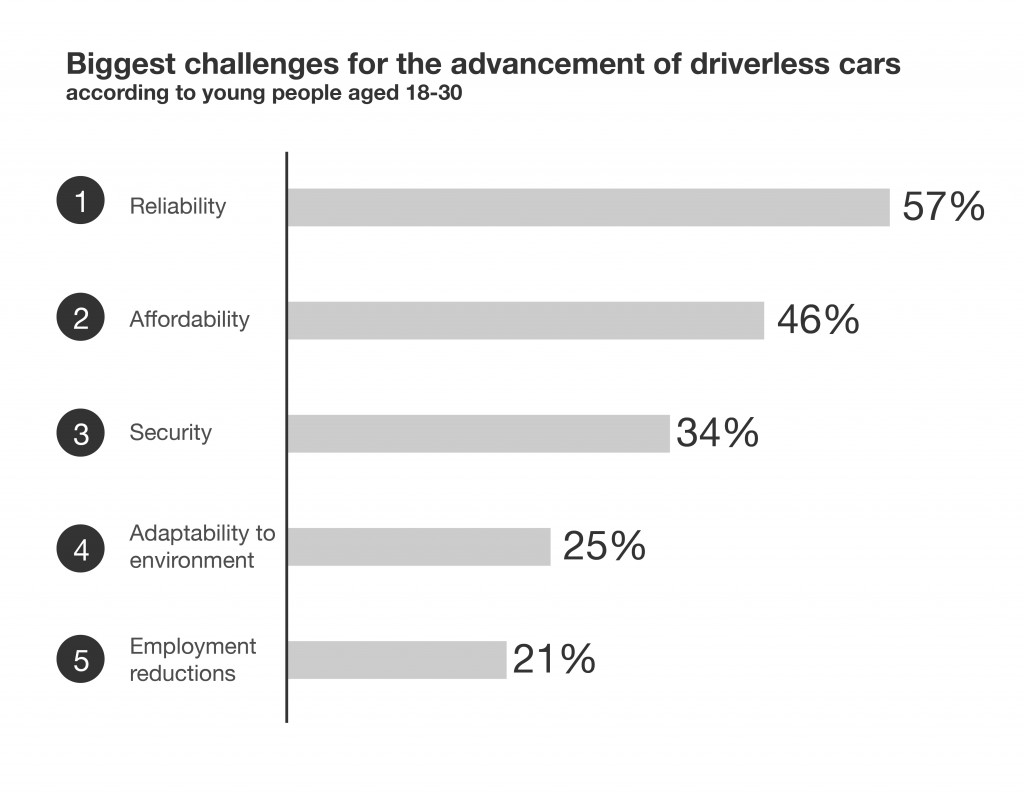While driverless cars are perhaps the most hotly anticipated piece of next generation tech, it seems the next generation aren’t interested. Despite having been raised on a diet of ever-changing technology, this latest innovation is proving difficult to swallow for Millennials. Recent research, by Goodyear and ThinkYoung, has revealed that only 22% of young people are prepared to hand over full control to their cars in the next ten years.
All or Nothing
A cautious 42% of people aged 18-30 were in favour of some driverless features. This seems to be a step in the right direction, but brings with it a number of problems. A wide range of advantages are predicted of a driverless world: from easing road congestion, to revolutionizing mobility for disabled drivers, to reducing emissions. However, it’s widely accepted that we can only reach this utopia with fully autonomous cars. Why? Because you’re the problem. Driver error is overwhelmingly the biggest cause of accidents on the road, with “failed to look properly” the most common contributory factor. To really reap the rewards of driverless cars, we would have to take ourselves out of the equation altogether.
It’s not that young people don’t foresee the benefits of the technology; they recognised that driverless cars could reduce traffic accidents, driver stress and tiredness, and traffic jams, but it doesn’t shake the distrust. So where exactly does the argument for self-driving cars fall down for Millennials?

Reliability
The number one concern was reliability, with over half (57%) of the young people surveyed highlighting this as an issue. To prove their robots can match an experienced human driver, Google are putting in the miles on the roads of Mountain View and the virtual roads of their simulator. So far, all reported accidents involving an autonomous car have been the fault of the human driver in the other vehicle.
Gill Pratt, CEO of the Toyota Research Institute, recently said that the reliability of driverless cars needs to be measured in trillions of miles, rather than millions. If Google’s cars are covering 3 million miles per day, it would take over 900 years to reach the trillion mile benchmark. With Toyota’s own autonomous car development well under way, it’s safe to say that Pratt’s figures may have been a little ambitious. Nevertheless, with fully autonomous technology still a few years from ready, and road laws still a few debates from cooperative, car manufacturers still have plenty of time to make the public as confident as they are.
Affordability
As would be the case for any young car buyer, one of the top concerns about driverless cars was the cost. 46% of young people selected affordability as one of the biggest challenges for the advancement of self-driving cars.
It’s currently not clear how much driverless cars will cost. They’re unlikely to be cheap. But what’s also unclear is how ownership of self-driving cars will pan out. It has been predicted that driverless cars will mostly be used in a public transport capacity, as self-driving taxis. Without the need to pay a driver, the cost of such transport could be dramatically lower than the costs today of both public transport and owning a car outright. There is also the possibility of car sharing, again bringing down the costs. Add to this the money saved on parking and driverless cars begin to look like a very affordable option. So while the cost of privately owning a self-driving car may be high, the average person may find themselves spending a lot less on transport. After all, the air travel industry doesn’t rely on everyone buying their own plane.
Security
Unsurprisingly for the Facebook generation, 34% were worried about privacy and security, and the potential for the cars to be hacked. The truth is that car hacking is not a thing of the future. As cars have become more computerized, they have become more exploitable by hackers and many of the cars on the roads now could be vulnerable to cyber attack.
The motivation, however, for a malicious attack on a car is relatively low. With no financial gain from taking control of a car, and the high investment required to overcome car security systems, criminal hackers are likely to remain focussed on the big money targets like banks. In addition to this, good, old-fashioned car-jacking may become a thing of the past: joyriding will likely not be much fun within the speed limit and without a steering wheel. Car chases will also be somewhat subdued: don’t expect much from the Bond film of 2030.
You can be sure that as self-driving cars make their way to the market, manufacturers will be spending considerable amounts of time and money on security. Cars are simply one more thing in our lives to become computerized and join the well-oiled software development machine.
So are driverless cars a lost cause with young people? Of course not. There doesn’t appear to be any fundamental objection to the technology, Millennials are just waiting to be convinced that self-driving cars are up to standard, and currently they’re probably not. But with a few years left in development, there’s ample time to tick all the boxes. It may not be an easy sell to start with, but only until people realise how much Candy Crush they can fit into their commute.
Full results of the survey are available on ThinkGoodMobility.com.
